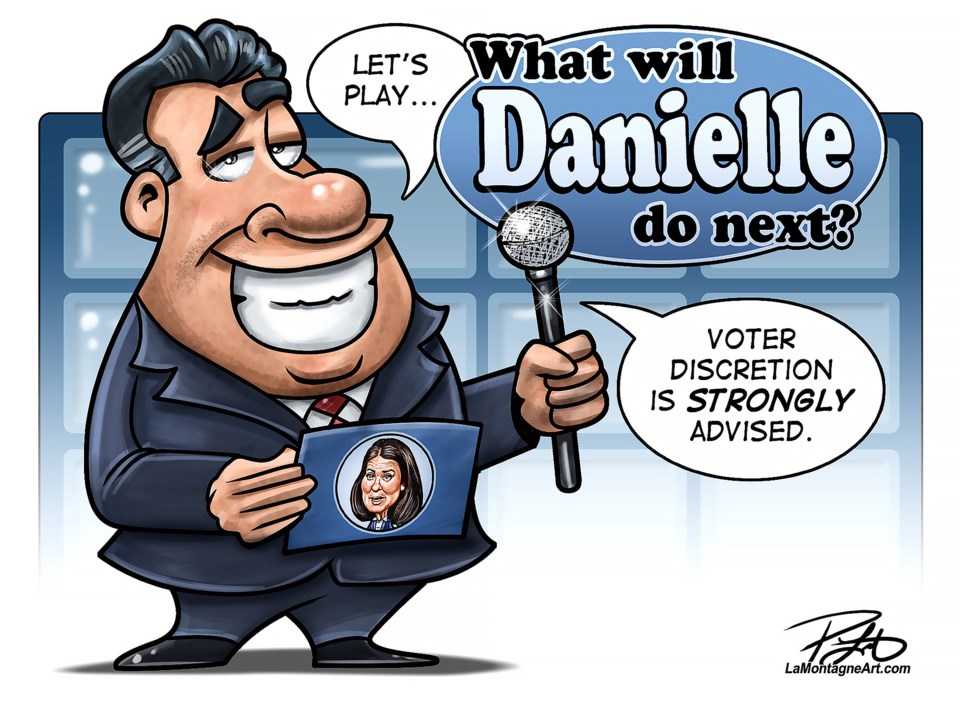The frosty relationship between the provincial government and municipalities was on full display during the annual Alberta Municipalities conference.
From Premier Danielle Smith’s comments on the RCMP and sheriffs being separate police forces, her insistence on electronic vote tabulator machine bans and pushing forward with legislative changes that could allow the province to sack municipal leaders, it’s clear there’s little love lost between the two tiers of government.
The largest contention remains two provincial bills that if passed in the legislature would allow cabinet to punt an elected official, repeal or amend a municipal bylaw, give the province greater power to direct a municipality when it comes to a public health or safety issue and a slew of changes under the elections act.
The bills, and the likelihood of them being passed in the coming months, have led many municipal elected officials to wonder what issue the province is attempting to solve.
However, consistent funding cuts have remained a point of frustration for municipalities from all corners of Alberta, leading to local governments bearing the brunt of growing infrastructure costs.
Alberta Municipalities, the advocacy group for 265 cities, towns and villages comprising about 85 per cent of the provincial population, overwhelmingly voted to push for a stop to the ban of electronic voting tabulators.
Municipalities have argued it will add costs, provide less accurate results and make ballot counting slower – let alone be punitive for municipal clerks throughout the province – but Smith has stood firm that the change will protect electoral integrity. The changes are expected to be in place for 2025 municipal elections.
The City of Red Deer reported to its council, noting the changes are expected to cost about $1.5 million for manual counting and be about three-and-a-half times the cost it was with electronic vote tabulators.
Calgary Mayor Jyoti Gondek has said preliminary estimates peg the cost increase at $1.3 million for the city’s next municipal election, while a report to Edmonton council said it will increase the city’s municipal election bill by $2.5 million.
Smith noted at the conference the province and municipalities aren’t always going to agree, but bluntly reminded the attendees municipal governments are “a creature of the provincial government.”
Smith’s declaration that the province has two police forces with the RCMP and sheriffs drew blowback from the federal police force’s Alberta division, calling it “inaccurate”, with Alberta RCMP Deputy Commissioner Rob Hill quoted as saying the strength and vacancy rates of RCMP in Alberta “is regularly miscommunicated”.
In one potential olive branch, Smith floated the idea of the provincial government collecting taxes rather than municipalities, who do so on behalf of the province. The collection process often confuses taxpayers in believing every dollar collected is done so to remain local, but roughly half the bill is done so for the province.
Smith said they’re looking for feedback, but noted it would likely be a large administrative cost and have municipalities give up a key power. She gave the example of the province looking at collecting personal income taxes rather than the federal government, but ultimately backing down due to a projected cost of more than $1 billion.
The province also said it would lower interest rate lent to municipalities – which was removed under the Jason Kenney government – to allow local authorities to borrow money at an even more favourable rate than they now receive and will help save millions across the board.
At the conference, Alberta Municipalities voted down an attempt to advocate for changes in the provincial elections act to give permanent residents the right to vote in municipal elections.
The attempt was previously endorsed by Banff council – particularly after a large segment of its population was unable to vote in the Banff Avenue pedestrian zone plebiscite vote – to expand voter eligibility.
Municipal Affairs Minister Ric McIver, however, has been adamant no such change would happen under his watch, all but sinking any shot had it been successful.
The likelihood of the back and forth between the province and municipalities simmering soon is highly unlikely, especially given that municipalities are ultimately the playthings of any provincial government.
The relationship doesn’t need to be as contentious as it is, but for the foreseeable future, the struggle will continue with Alberta residents caught in the middle.




